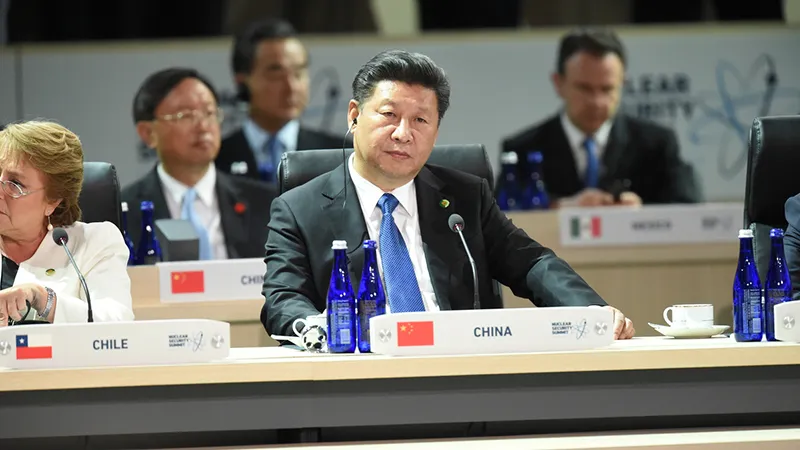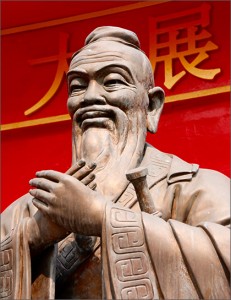-
CENTRES
Progammes & Centres
Location

China and the United States on March 31 reaffirmed their joint commitment to global nuclear security and pledged to continue cooperation in this area beyond the Nuclear Security Summit (NSS) process. In a joint statement released as Chinese President Xi Jinping and US President Barack Obama met here on the sidelines of the fourth NSS, the two countries declared their "commitment to working together to foster a peaceful and stable international environment by reducing the threat of nuclear terrorism and striving for a more inclusive, coordinated, sustainable and robust global nuclear security architecture for the common benefit and security of all."Nuclear security cooperation has become a bright spot in the building of a new type of major-country relations between the world's largest developing and developed countries. The NSS process, initiated by Obama and headlined by a biennial leaders' meeting since 2010, will come to an end in its current format after the fourth summit, though nuclear security is faced with increasingly grave and complicated challenges.
Source(s): The Xinhua News Agency, March 31, 2016
Declaring an air defence identification zone (ADIZ) is the right of a sovereign country and other countries should not "point their fingers" on this, China's defence ministry said on March 31 in response to reports that the US would not recognize an exclusive zone in the South China Sea. "Whether and when to do it depends on whether and to what extent China faces air security threat," Chinese national defence ministry spokesperson Yang Yujun told a press conference in Beijing. US Deputy Secretary of Defense Robert Work said Wednesday that the US has informed China it will not recognize an ADIZ in the South China Sea and would regard such a move as "destabilizing," Reuters reported. China set up an ADIZ in the East China Sea in 2013 to "safeguard its sovereignty and airspace security." The US and some countries have been expressing their worries about China establishing another ADIZ in the south.
Source(s): Global Times, April 1, 2016
A Chinese defense ministry spokesperson said on March 31 that Japan should be more transparent about its military budget. Japan has been increasing its defense spending for years, sparking concern among its neighbors and the international community, spokesperson Yang Yujun told a monthly press conference, saying Japan should explain its real intentions. Japan has approved a record-high 5.05 trillion yen (about 41.90 billion U.S. dollars) military budget for the 2016 fiscal year, a 1.5 percent increase from 2015. This is the fourth consecutive year that Japan has increased its defense budget.
Source(s): The Xinhua News Agency, March 31, 2016
China’s violence-prone far western region of Xinjiang has begun a campaign to promote ethnic unity with a call for respect of the cultures of the minorities who call the region home, while vowing another crackdown on terrorism and separatism. Hundreds of people have been killed in unrest in Xinjiang in the past few years. The government blames the violence on Islamist militants who want to establish an independent state called East Turkestan for minority Uygurs, a mostly Muslim people who speak a Turkic language and hail from Xinjiang.
Source(s): South China Morning Post, April 1, 2016

Reflections on the Cultural Revolution must not go beyond the Communist Party’s official verdict, a state media editorial cautioned on Wednesday ahead of the 50th anniversary of the outbreak of the political movement. “Reflections are normal ... but they should not add or change
Source(s): South China Morning Post, March 31, 2016
The Inner Mongolia autonomous region appointed Buxiaolin as its acting chairwoman on Wednesday. Both her father and grandfather had previously served as chairman. Buxiaolin, who is from the Mongolian ethnic group, was appointed as acting chairwoman by the Standing Committee of the Inner Mongolia regional People's Congress after it accepted the resignation of the former chairman, Bater. The 58-year-old Buxiaolin becomes the second female official in China to be put in charge of the government's work in an autonomous region, after Liu Hui, chairwoman of the Ningxia Hui autonomous region.
Source(s): China Daily, April 1, 2016
The State Council, China's Cabinet, on March 31 unveiled this year's top economic reform priorities. The reforms for 2016 touched upon 10 fields, ranging from state-owned enterprise (SOE), to the opening-up policy, the State Council said in a statement. To boost sustainable growth, the government will unveil more measures to help researchers commercialize their findings and facilitate innovation and entrepreneurship. In the statement, the government vowed to further cut red tape, loosen controls on market access and investment, and push forward supply-side structural reforms, to reduce overcapacity, destock, deleverage, reduce costs and shore up weak growth areas. In terms of taxation, the VAT program will expand to all industries this year, while taxes on imported consumer goods are expected to be slashed, easing the tax burdens of both enterprises and ordinary consumers.In the financial sector, China vowed to promote RMB convertibility on the capital accounts "steadily and cautiously" and launch a stock connect program between the Shenzhen and Hong Kong bourses in 2016. These are few of the decisions regarding reform, taken. The National Development and Reform Commission, the economic planner, will be responsible for supervision and evaluation of the reforms' implementation, it said.
Source(s): People’s Daily, March 31, 2016
China's top listed steelmaker Baosteel (600019.SS) expects output this year to rise about 20 percent, even as the country steps up efforts to slash a huge overcapacity that has boosted cheap exports and caused some producers elsewhere to shut. The announcement by Baoshan Iron and Steel Co Ltd, or Baosteel, comes a day after India's Tata Steel (TISC.NS) put its British operations up for sale, blaming the move that leaves thousands of jobs at risk on a flood of cheap Chinese supplies. China has been aggressively shipping out surplus steel and selling them, according to other producing nations, at unfairly low prices. Exports hit a record 112 million tonnes in 2015. China makes half of the world's steel and produced 803.8 million tonnes in 2015.
Source(s): Reuters, March 31, 2016
Ninety-three provisions of Premier Li Keqiang's annual Government Work Report answered the concerns of netizens who offered more than 180,000 suggestions in an online poll, officials said on Thursday. Both numbers were double those of last year, when the first such poll was conducted to solicit grassroots opinions and help shape decision-making of the central government. The website of the central government, gov.cn, conducted the poll-titled" I have a question for the premier"-to gauge the issues that concerned netizens the most. In addition, 10 traditional and new media outlets, including chinadaily.com.cn, participated to collect messages and suggestions from readers and followers.
Source(s): China Daily, April 1, 2016
China's internet giant Baidu has a new plan- to be launched on April 1-to include science fiction writers in its research on artificial intelligence. The Baidu Verne Plan involves setting up a consulting team to bring the world's best science fiction writers together with leading scientists in a quest to turn imagination into reality. The project, named after French novelist Jules Verne, has already invited six people to be the first group of advisers in the team, according to Beijing-based Baidu. The company said that some of Verne's imagination seen in his books in the 19th century, such as helicopters, had been realized in the 20th century.
Source(s): China Daily, April 1, 2016
1. Shannon Tiezzi, “Obama, Xi Put Positive Spin on US-China Relations”, The Diplomat April 1. 2016
2. “Eliminating root causes of terrorism indispensable to nuclear security”, The Xinhua News Agency, March 30, 2016
3. Nathaniel Taplin and Pete Sweeney, “China official factory activity unexpectedly expands but job losses mount”, Reuters, April 1, 2016
4. “China's Large Banks Wary on Li Keqiang's Plan for Bad Loans”, Bloomberg, March 30, 2016
5. Wang Xiangwei, "Vaccine scandal highlights public’s lack of trust in the Chinese government", South China Morning Post, March 28, 2016
6. Alex Lo, "In light of today’s political realities, Beijing needs to rethink what ‘one China’ really means", South China Morning Post, March 28, 2016
The views expressed above belong to the author(s). ORF research and analyses now available on Telegram! Click here to access our curated content — blogs, longforms and interviews.